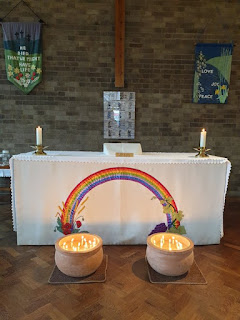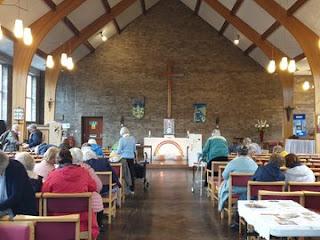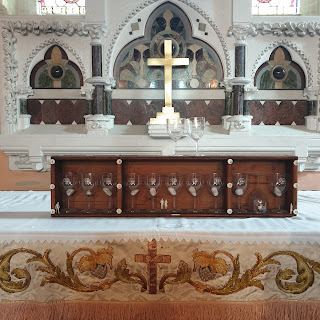From the mid-1920s onwards, Evelyn Underhill became highly-regarded as a retreat conductor and an influential spiritual director. Her first experience of a conducted retreat at the Pleshey retreat house in 1922 transformed her attitude toward church and vocation, and began the process of clarifying her own calling.
Born on 6th December 1875 in Wolverhampton, from an early age she described having mystical insights, and her deep interest in spiritual matters continued throughout her life. Between 1921 and 1924 her spiritual director was Baron Friedrich von Hűgel, who encouraged her to place Jesus Christ more centrally at the heart of her reflections. After his death in 1925 she began taking on a prominent role in the Church of England, leading retreats at Pleshey and elsewhere, and as a spiritual guide to many. Amongst the books she published are ‘Mysticism’ (in 1911) and ‘Worship’ (in 1936). She was one of the first women theologians to give public lectures at English universities, and was the first woman allowed officially to teach Church of England clergy.
Evelyn Underhill is one of the most important Christian mystics of the twentieth century and was one of the first important figures to champion the humility, ordinariness, and indeed “normalcy” of the mystical life. The subtitle of one of her best books, ‘Practical Mysticism’ is “A Little Book for Normal People.” She worked hard to dispel the notion that mysticism only belonged to the super-holy, the super-religious, the super-pious. On the contrary, the contemplative life is the ordinary state for Christian maturity. (http://evelynunderhill.org/three-evelyn-underhill-anthologies/)
In her book on The Fruits of The Spirit, she wrote about today's Gospel passage (Matthew 6.1-6, 16-18) in relation to retreats:
“Christ, who so seldom gave detailed instruction about anything, did give some detailed instruction of that … recollection which is the essential condition of real prayer, real communion with God.
"When you pray, go into a room by yourself - and shut the door." I think we can almost see the smile with which He said those three words, and those three words define what we have to try to do. Anyone can retire into a quiet place and have a thoroughly unquiet time in it - but that is not … the shutting of the door …
Shut the door. It is an extraordinarily difficult thing to do. Nearly everyone pulls it to and leaves it slightly ajar so that a whistling draught comes in from the outer world, with reminders of all the worries, interests, conflicts, joys and sorrows of daily life.
But Christ said shut and He meant shut. A complete barrier deliberately set up, with you on one side alone with God and everything else without exception on the other side. The voice of God is very gentle; we cannot hear it if we let other voices compete. It is no use at all to enter that room, that inner sanctuary, clutching the daily paper, the reports of all the societies you support, your engagement book and a large bundle of personal correspondence. All these must be left outside.
The object … is not intercession or self-exploration, but such communion with Him as shall afterwards make you more powerful in intercession; such self loss in Him as shall heal your wounds by new contact with His life and love.”
Evelyn Underhill was writing specifically for retreatants but Jesus’ words were not originally addressed to those on retreat. Instead, they were addressed to ordinary people going about their everyday lives, so his call to shut the door when praying was not once a year when we are on retreat but each time we pray. Likewise, seeking the opportunity of being alone with God and attending to God in order that we may do His will better in our everyday lives is not intended by Jesus as a once a year opportunity, rather as a regular experience.
The reward that God provides for our private prayers is the multiplication of all that we give, as St Paul says in our reading from 2 Corinthians 9: ‘He who supplies seed to the sower and bread for food will supply and multiply your seed for sowing and increase the harvest of your righteousness.’
That was the experience of Mary Sumner who, in 1876, wrote her own personal prayer which she then prayed every day for the rest of her life: ‘All this day, O Lord, let me touch as many lives as possible for thee; and every life I touch do thou by thy spirit quicken, whether through the word I speak, the prayer I breathe or the life I live. Amen.’
Later, Mary decided that a new organisation was needed in her parish and the first branch of Mothers' Union was begun. She was spurred into action when her eldest daughter gave birth to her first baby. Mary remembered her feelings of inadequacy as a young mother charged with the terrible responsibility for a new life. She believed that women from every class needed to understand that motherhood was a profession and be equipped to perform it. Motherhood involved more than providing for the physical needs of children. The primary responsibility of mothers was to raise their children in the love of God. Mothers could only do this, she believed, if their lives were firmly rooted in prayer.
Her plan for a new form of mothers’ meeting, bringing together mothers of all classes, did not start auspiciously. Having gathered the women of the parish in the Rectory, Mary could not present her ideas due to nerves. She had to call them together again a week later to explain the objects of the new society and to give out simple cards containing practical suggestions.
In 1885, Bishop Ernest Wilberforce of Newcastle called on Mary to speak to a women's meeting made up of 1000 poor and anxious women at the Portsmouth Church Congress. Despite her initial resistance, as at that time respectable women did not address public meetings, she agreed. Painting a picture of the low moral standards in the country, she asked what could be done to improve the national character. Her answer was that the power for change lay in the hands of mothers. If women united in prayer and committed themselves to a Christian life the nation could be transformed.
The meeting responded to her passion and conviction with a rousing ovation. It was on this wave of public enthusiasm that the Bishop of Winchester decided to make Mothers' Union a diocesan organisation. This decision was destined to change the lives of many far beyond the boundaries of the diocese of Winchester.
The global movement that is the Mothers’ Union began with personal prayer in a room with a shut door and grew as a result of the prayer that underpinned its growth. May our generation commit ourselves to prayer by following the examples of Jesus, Evelyn Underhill and Mary Sumner. Amen.
------------------------------------------------------------------------------------------------------












